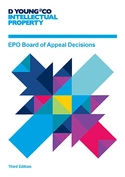CRISPR patent appeal decision: EPO maintains “all applicants” approach to priority
Earlier in 2020, the Board of Appeal dismissed the Broad Institute’s appeal (T 0844/18) against revocation of one of its key CRISPR-Cas9 patents, EP2771468B. Here we discuss the Board of Appeal’s recently published decision.
As we reported previously, the proceedings focused on entitlement to claim priority from an application filed by multiple applicants.
Article 87(1) EPC states that “Any person who has duly filed […] an application for a patent, […] or his successor in title, shall enjoy, for the purpose of filing a European patent application in respect of the same invention, a right of priority during a period of twelve months from the date of filing of the first application”. According to established EPO practice, the “any person” is considered to be all applicants of the priority application, or their successors in title (the “all applicants” approach).
EP2771468B claimed priority from multiple US provisional applications, the earliest two of which included an applicant-inventor who was not an applicant of the subsequent PCT application. No transfer of his rights to claim priority appears to have occurred before the subsequent application was filed. As a result, the opposition division decided that the patent was not entitled to claim priority from the earliest two priority documents, and the patent was revoked in light of novelty-destroying intervening disclosures.
In their appeal, the patentees/appellants set out their arguments in the form of three questions:
- Should entitlement to priority be assessed by the EPO?
- How is the expression “any person” in Article 87(1) EPC to be interpreted?
- Does national law (in this case US law) govern the determination of “any person” who has “duly filed” in Article 87(1) EPC?
We have highlighted some of the appellants’ arguments and the Board of Appeal’s answers to these questions below.
1. Should entitlement to priority be assessed by the EPO?
Claiming that the EPO should not assess entitlement to priority, the appellants argued that the EPC exhaustively lists the requirements for an applicant to claim priority, but proof of right or an assessment of ownership is not required. Regardless, the EPO does not decide on the ownership of a patent (Article 60(3) EPC). Therefore, the EPO should not introduce an additional formal requirement for claiming priority.
However, the Board of Appeal decided that Article 87(1) EPC clearly requires the EPO to examine who can claim priority, and there is no basis in the EPC for disregarding this requirement. Moreover, there is no requirement that the “any person” was legally entitled to file the application. Accordingly, the EPO merely carries out a formal assessment of the person filing the application. The Board of Appeal also stated that there is no priority-based equivalent to Article 60(3) EPC, and this gap does not necessarily need to be filled by analogy from another EPC provision.
The Board of Appeal recognised that the EPC sets out many formal requirements for obtaining a patent (such as paying fees or meeting time limits); and the loss of a patent due to not meeting formal requirements is a feature of the EPC system.
Therefore, the Board of Appeal concluded that the EPO is empowered and obliged to assess the validity of a priority right.
2. How is the expression “any person” in Article 87(1) EPC to be interpreted?
The appellants argued that, in light of the ordinary meaning of the term “any”, and the object and purpose of the Paris Convention, the expression “any person” must be interpreted as ‘any one person’ (that is, one, a plurality or all applicants of a priority application can validly claim priority). Additionally, neither the EPC nor the Paris Convention specifies that all applicants of the priority application must also be applicants of the subsequent application, to validly claim priority.
However, the Board of Appeal emphasised that the EPC is a special agreement within the Paris Convention, meaning its provisions cannot contradict the basic principles concerning priority in the Paris Convention. Accordingly, the legal concept of “any person” in Article 4A Paris Convention should be interpreted and applied to the EPC.
The Board of Appeal found that the ordinary meaning of the term “any person” is ambiguous in all authentic texts of the EPC and Paris Convention; and their contexts do not help. However, it considered the “all applicants” approach to be a plausible interpretation of the Paris Convention’s authentic text.
The Board of Appeal and the appellants were in agreement that the object and purpose of the Paris Convention are to safeguard the interests of an applicant in their endeavour to obtain international protection for their invention; and this is assisted by the priority provisions. However, the appellants asserted that the “all applicants” approach allows disputes over ownership to destroy a patent itself; and violates Human Rights, because one applicant could hold the others to ransom by refusing to join in as an applicant for the subsequent application.
In contrast, the Board of Appeal asserted that the “any one applicant” interpretation would allow one or more applicants to deprive others of their rights to a patent in another country, contrary to the object and purpose of the Paris Convention. The “all applicants” approach is not an obstacle to the exercise of a priority right; it is an obstacle to one applicant filing a subsequent application on their own. There is no evidence that the object and purpose of the Paris Convention are to facilitate this. Moreover, an applicant can progress a patent application before the EPO without the active participation of other applicants.
The Board of Appeal decided that if a group of persons together decides to file an application as a unity, the “any person” is this group as such. The Paris Convention seeks to facilitate this action: using priority, applicants can be treated as if they had simultaneously filed the same application in multiple states, which would otherwise be very difficult.
Furthermore, the Board of Appeal found that there is no case law that clearly and unambiguously adopts the appellants’ position. The priority provisions of the Paris Convention have remained essentially unchanged since 1883.
The appellants also attempted to distinguish between “internal” priority claims, where both the priority and subsequent applications are European; and “external” priority claims, where the priority application is non-European. The appellants argued that all of the case law that supports the “all applicants” approach was concerned with the former, and is not applicable to the latter. However, the Board of Appeal considered that the EPO is obliged to apply Article 4A Paris Convention in the same way for internal and external priorities.
Therefore, the Board of Appeal decided that the expression “any person” in Article 87(1) EPC requires that all applicants for the priority application, or their successors in title, are applicants for the subsequent application.
3. Does national law (in this case US law) govern the determination of “any person” who has “duly filed” in Article 87(1) EPC?
The appellants argued that a priority right arises before a subsequent application is filed, meaning that only national law can determine the “any person” in Article 87(1) EPC. Article 87(2) EPC relies on national law to determine whether a filing is a regular filing, so national law should also determine who filed the application. Under US law, an inventor is only an applicant for subject matter they contributed to, whereas the missing applicant in this case was not an inventor of the claimed subject matter. Notably, to validly claim priority from a multi-invention, multi-applicant provisional application under the “all applicants” approach, a US inventor-applicant would either have to be an applicant before the EPO for an invention they didn’t make; or they would have to assign, to a successor in title, their non-existent rights in an invention made by someone else.
However, the Board of Appeal asserted that Articles 87(1) and (2) EPC, and corresponding Articles 4A(1) and (2) Paris Convention, do not refer to the inventor or applicant for a patent application; instead they refer to the person who filed the application. Whether they are the inventors, or entitled to be applicants, are not issues requiring investigation under the Paris Convention. This is clear from the authentic French text and travaux préparatoires of the Paris Convention: reference to the author of the invention was specifically removed from the priority provisions during drafting, to avoid questions of definitive right of ownership.
Therefore, the Board of Appeal decided that the Paris Convention is the law that determines the “any person” in this case, meaning there is no reason to deviate from the answer to the appellants’ second question.
Submission of questions to the Enlarged Board of Appeal
The appellants requested submission of their questions to the Enlarged Board of Appeal. Under European patent practice, a Board of Appeal shall refer a question to the Enlarged Board if it considers that a decision is required to ensure uniform application of the law, or because a fundamentally important point of law arises. Even in the latter case, it is at the Board of Appeal’s discretion whether to refer questions; and the Board of Appeal should consider if it can answer the questions beyond doubt by itself.
The Board of Appeal found that the EPO has always adopted a consistent interpretation of Article 87(1) EPC, and it was able to answer the appellants’ questions beyond doubt. Therefore, no referral was considered necessary, and the appeal was rejected.
Importantly, the Board of Appeal emphasised that applicants wishing to use US provisional applications as priority documents should be aware of the difficulties they face if they use these applications to claim priority for an EP application. Again, this decision is a clear reminder to verify that all applicants of a priority application are listed on the subsequent application; or otherwise that the transfer of rights to claim priority takes place before the filing date.


